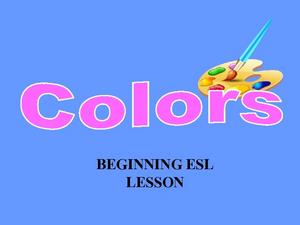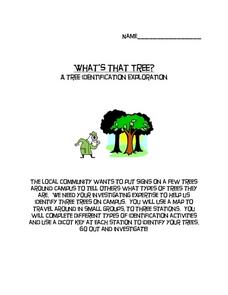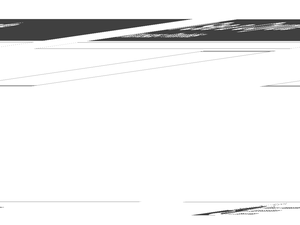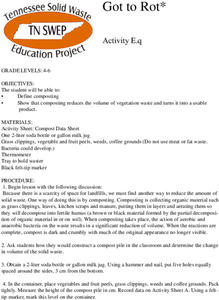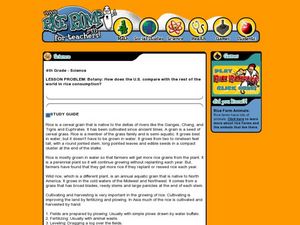Curated OER
Garbage in the Garden
Young scholars create their own compost. In this soil lesson plan, students fill a bag with waste and soil, in order to create a mini compost bin. Young scholars observe the baggies over a 6 week period, they record their findings and...
Curated OER
Colors: Beginning ESL Lesson
Explore the vivid world of colors with this straightforward ESL presentation. Each slide presents a color word in its color (the word "red" is colored red) and a picture to accompany the word. The presentation would be a good review tool...
Curated OER
Poetry: "The Poplar Field" by William Cowper
Explore poetry analysis. Learners read the poem "The Poplar Field" by William Cowper, answer a series of questions, and discuss literary devices. It is a terrific way to help your class understand how to read and understand poetry.
Curated OER
Future Perfect Tense with Negatives
Do your young grammarians need extra practice using the correct form of verbs in the future perfect tense with negatives? A 10 sentence worksheet will reveal whether or not they have mastered this verb sequence. No answer sheet is included.
Curated OER
The good microbes
The question posed for the class to consider; What would decay and what would not? They read the short passage on decomposition and microbes, then mark the items that would decay after a two-week period. A scientific investigation idea...
Curated OER
Food chains and webs
Here is an extremely simplistic look at food chains and webs. It depicts three different food chains, each containing a plant, plant eater, and meat-eater. Learners fill in the missing part of each chain by using the images provided at...
Curated OER
Slash Trash! Reducing, Reusing and Recycling Our Way to Zero Waste
The other "Three Rs" are covered in this lesson: reduce, reuse, and recycle. Over four weeks, conservationists collect data about waste in their own homes. They combine their findings with those of other young scholars in order to...
Curated OER
Vegetable Flowers with Homemade Ranch Dip
Vegetables aren't just things we can grow to eat; now they are things we can grow to create art! Use this cute and kid-friendly recipe during your next Earth Day celebration. It includes step-by-step instructions on how to turn...
Curated OER
Now You Have It, Now You Don't
Students compare shipping peanuts made from corn and made from Styrofoam. In this corn based peanuts lesson, students understand why to use eco-friendly materials for packing. Students participate in an experiment to compare the...
Curated OER
Wetland Plant Detectives
Sixth graders identify plants in the wetlands. In this plant detectives instructional activity, 6th graders complete a scavenger hunt on a local reserve, record observations, and respond in their journals.
Curated OER
Plant Parts
In this plant parts worksheet, students read for information and demonstrate comprehension. In this true and false, fill in the blank, short answer, and multiple choice worksheet, students answer ten questions.
Curated OER
What's That Tree?
Fifth graders identify trees along a nature trail. Using a dichotomous key, 5th graders answer questions to aid in their identification of trees along a specified nature trail. Observations are recorded in their science journals. Sample...
Curated OER
I See a Coyote
Students role-play coyotes looking for natural resources. In this natural resources instructional activity, students examine the relationship between animal life and the environment. Students play a game that demonstrates how natural...
Curated OER
Case of the Missing Pumpkin
Learners explore the process of decomposition in plants. In this plant biology lesson, students use a cleaned out pumpkin and observe how the decomposition process takes place. Learners write down adjectives to describe the pumpkin.
Curated OER
Where Growth Meets Growth
Students discuss fire risk factors for a property located near a wildland area. In this science lesson, students identify, number, and provide reasons for areas of increased risk on a worksheet they think should be changed. Students...
Curated OER
Animal Facts and Opinions
In this fact and opinion instructional activity, students read 20 informative sentences about animals. Students write "fact" or "opinion" for each sentence.
Curated OER
Got to Rot
Students make their own compost in a 2-liter jug and determine the actual volume loss in the composted material over a six-month period.
Curated OER
Rice Consumption
Fourth graders discover facts about rice and how it is farmed. In this rice research lesson plan, 4th graders investigate how much rice is eaten in the United States compared to other countries. Students research countries and graph the...
Curated OER
Mammals: Teeth and Diet
In this mammals' teeth and diet worksheet, students read for information, identify kinds of teeth, and sort animals into categories. In this fill in the blank and T-Chart worksheet, students write multiple answers for two questions.
Curated OER
A Fun Alternate Way to Teach Children Keyboarding1
Students use mnemonics rather than mindless repetition to help them remember keyboard locations. They examine the left side home row, backspace key, and space bar using large, teacher-made keyboard.
Curated OER
Biomass: The Energy of the Future
Sixth graders examine information about a variety of renewable fuels. They read key vocabulary terms, read and discuss a story handout, and conduct research on renewable fuels. Students then complete a comparison chart, and write an...
Curated OER
Seed Socks
Students explore how seeds travel. In this seed disbursement lesson, students head outside in their bare socks. Students walk around then before going inside they take the socks off and examine what their socks picked up. As a class the...
Curated OER
3rd grade life science
In this life science activity, 3rd graders answer multiple choice questions about plants, birds, habitats, and more. Students complete 20 questions.
Curated OER
Case of the Missing Pumpkin
Learners explore the process of decomposition. In this science lesson, students carve a pumpkin and observe as it decomposes. Learners compare the changes to an uncarved pumpkin. Students write about the disappearing pumpkin.



